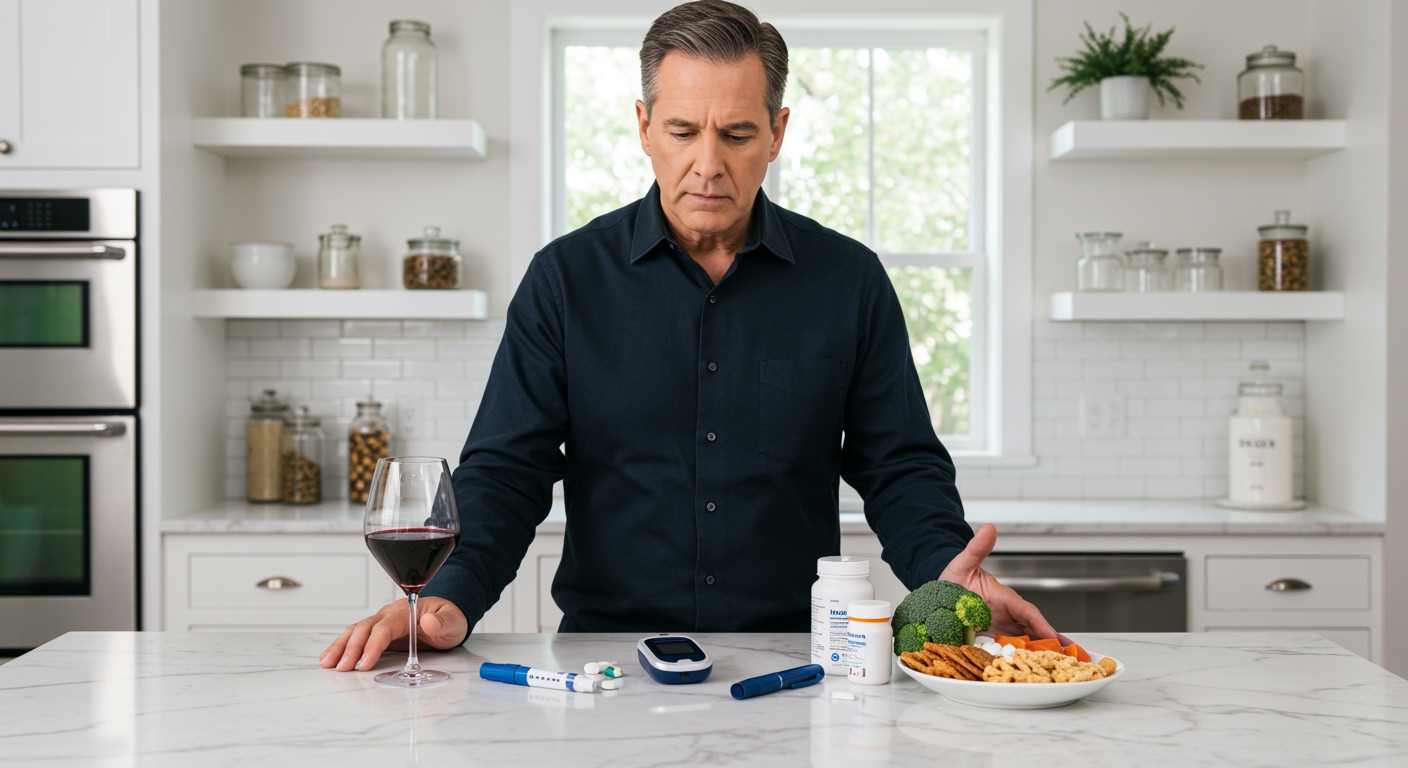✪ Key Takeaway: Moderate alcohol consumption can be safe for many people with diabetes when properly managed with food and medication timing.
Introduction
Your doctor just told you that you have diabetes, and suddenly everyone has an opinion about what you can and cannot drink.
You might be wondering if your weekend glass of wine or occasional beer is now completely forbidden territory.
Hi, I’m Abdur, your nutrition coach, and today I’m going to explain the complex relationship between alcohol and diabetes management so you can make informed decisions about your health.
How Does Alcohol Affect Blood Sugar Levels?
Alcohol creates a unique challenge for your blood sugar control because it affects your body in two opposing ways.
When you drink alcohol, your liver stops producing glucose to focus on breaking down the alcohol instead.
This process can cause your blood sugar to drop dangerously low, especially if you take insulin or certain diabetes medications.
However, many alcoholic drinks also contain carbohydrates that can raise your blood sugar initially.
Sweet cocktails, beer, and wine all have varying amounts of sugar that your body must process alongside the alcohol.
The timing of these effects matters because the blood sugar spike happens first, followed by the potential drop hours later when your liver is still busy processing alcohol.
✪ Pro Tip: Always eat food containing protein and complex carbs before drinking to help stabilize blood sugar levels.
What Are The Risks Of Drinking With Diabetes?
The biggest risk is delayed hypoglycemia, which can occur up to 24 hours after drinking.
This delayed reaction happens because your liver prioritizes alcohol metabolism over glucose production, leaving you vulnerable to dangerous blood sugar drops.
People taking insulin or sulfonylurea medications face the highest risk because these drugs can amplify the blood sugar lowering effects.
Alcohol also impairs your ability to recognize hypoglycemia symptoms, making it harder to respond appropriately when your blood sugar drops.
Regular heavy drinking can worsen diabetes complications like nerve damage, kidney disease, and eye problems over time.
Additionally, alcohol provides empty calories that can contribute to weight gain and make blood sugar control more difficult.
✪ Fact: Alcohol-induced hypoglycemia can be mistaken for intoxication, delaying proper treatment.
Can People With Diabetes Drink Alcohol Safely?
Many people with diabetes can enjoy moderate alcohol consumption when they follow proper safety guidelines.
The key is understanding what moderate means: up to one drink per day for women and up to two drinks per day for men.
One standard drink equals 12 ounces of beer, 5 ounces of wine, or 1.5 ounces of distilled spirits.
Your blood sugar control must be well-managed before considering alcohol consumption, with an A1C level below 7 percent.
People with certain diabetes complications like severe neuropathy, frequent hypoglycemia, or gastroparesis should avoid alcohol completely.
Always discuss alcohol consumption with your healthcare provider, especially if you take medications that can interact with alcohol or increase hypoglycemia risk.
✪ Note: Never drink alcohol on an empty stomach when you have diabetes.
What Are The Best Alcoholic Drinks For Diabetics?
Choose drinks with lower carbohydrate content to minimize blood sugar spikes.
Dry wines like Pinot Grigio, Sauvignon Blanc, and Cabernet Sauvignon contain fewer residual sugars than sweet wines.
Light beers typically have fewer carbs than regular beers, but check labels because carb content varies significantly between brands.
Distilled spirits like vodka, gin, whiskey, and rum contain zero carbohydrates when consumed straight or with sugar-free mixers.
Avoid sweet cocktails, liqueurs, and mixed drinks that contain fruit juices, simple syrups, or sugary mixers.
When mixing drinks, use sugar-free alternatives like diet soda, club soda, or fresh lime juice instead of regular mixers.
✪ Pro Tip: Read nutrition labels on alcoholic beverages just like you would for food products.
How Should You Monitor Blood Sugar When Drinking?
Check your blood sugar before drinking to ensure it starts in a safe range above 100 mg/dL.
Monitor your levels more frequently while drinking and for several hours afterward, especially before bedtime.
Set an alarm to check your blood sugar during the night if you drank alcohol in the evening, as delayed hypoglycemia often occurs while sleeping.
Keep glucose tablets or fast-acting carbs nearby in case your blood sugar drops unexpectedly.
Wear a medical alert bracelet that identifies you as having diabetes, since hypoglycemia symptoms can be mistaken for alcohol intoxication.
Never drink alone when you have diabetes, and make sure someone with you knows how to recognize and treat low blood sugar emergencies.
✪ Fact: Blood sugar can drop up to 24 hours after your last drink, making extended monitoring crucial.
The Bottom Line
Moderate alcohol consumption can be part of a diabetes management plan when approached with proper knowledge and precautions.
Your health decisions should always prioritize safety over convenience, and that includes being honest about your drinking habits with your healthcare team.
I would love to hear about your experiences managing diabetes and alcohol, or any questions you might have about making these decisions work for your lifestyle in the comments below.
References
At NutritionCrown, we use quality and credible sources to ensure our content is accurate and trustworthy. Below are the sources referenced in creating this article:
- MedlinePlus: Diabetes and alcohol
- PMC: Alcohol consumption and the risk of type 2 diabetes
- Mount Sinai: Diabetes and alcohol
- WebMD: Drinking alcohol





